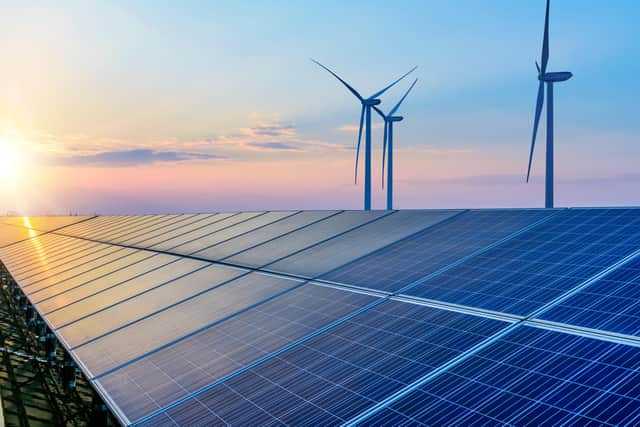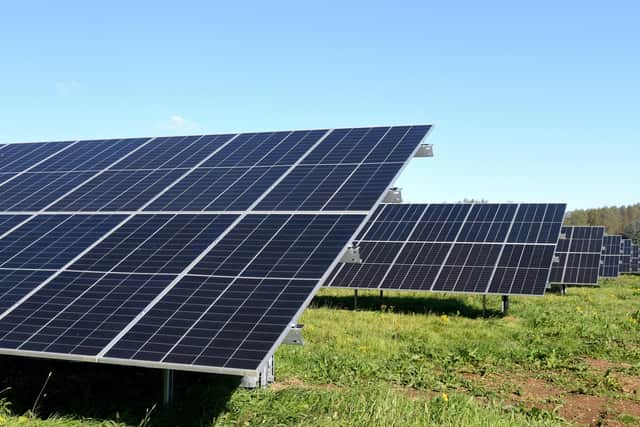Why Yorkshire solar farms are false economy when nuclear power can solve energy security crisis – Jason Reed
While climate change is a real and pressing issue, this is a clumsy way of tackling it which will cause a great deal of collateral damage, especially when it comes to food security.
Food prices are rising. Nearly 60 per cent of the British public will feel the pinch and find it significantly more difficult to put food on the table, according to Sue Davies, head of consumer rights and food policy at Which?
Advertisement
Hide AdAdvertisement
Hide AdMore than ever, we must be able to rely on our farming sector to produce as much of the food we need as possible. The more of our farming land we cover with solar panels, the harder that becomes.


As well as the national consequences, this is an issue which affects Yorkshire directly. For example, Harrogate Council has approved a plan for an enormous new 50-hectare solar farm near South Stainley. Its supporters claim it will be able to power up to 15,000 homes.
That might sound like a lot, but when you take the costs into account, its productivity is far too low. At that rate, in order to power all 29 million homes in the UK, we would need to build another 2,000 huge solar farms like the one in Harrogate, covering a total of 100,000 hectares.
This is simply not a viable way to meet Britain’s energy needs.
Advertisement
Hide AdAdvertisement
Hide AdToo often, local authorities’ desires to get as close as possible to their ambitious net-zero targets results in important concerns not getting the attention they deserve.


As Tim Read put it at a parish meeting about the Harrogate plan: “This development is in the wrong place, of an inappropriate scale and form, and can not comfortably be incorporated into the existing or even enhanced landscape that the applicant has proposed.”
The South Stainley project, run by Elgin Energy, is one of countless similar solar farms at various stages in the planning application process.
At least 17,991 acres of greenfield sites around the country are set to be filled with solar panels under schemes currently in the works.
Advertisement
Hide AdAdvertisement
Hide AdThat is according to the Solar Campaign Alliance, which has emerged from small opposition groups that have popped up across England to oppose solar farms in their local areas. Solar Media, another group, estimates there are around 910 possible solar farm projects in the works in the UK.
The true figure is likely to be higher than the campaigners estimate because not all project details are publicly available. Hampshire alone has seen applications at 28 different sites covering a whopping 3,500 acres since the start of 2020.
One proposed 200-acre solar farm by Enso Energy covers six fields, an area equivalent in size to some 140 football pitches. If planning permission is granted for the scheme, it would become the fifth largest solar farm in England, and the largest in England on agricultural land.
Yet, 200 acres is entirely typical of the size of new solar farm planning applications. We are on a slippery slope, propelled by our honourable wish to save the planet but pursuing a misguided path.
Advertisement
Hide AdAdvertisement
Hide AdBefore long, you won’t be able to turn a corner in what used to be the English countryside without seeing an ugly, industrialised solar farm.
Unavoidably, Britain cannot sustain itself on renewable energy and won’t be able to do so for a very long time, no matter how much farmland is taken over by solar panels.
If we want to wean ourselves off fossil fuels, especially Russian oil and gas, we would be much better off investing more in nuclear. The Rolls-Royce mini nuclear reactor is a good start, but it’s nowhere near enough.
Crucially, changing our approach to energy must not come at the cost of the British farming sector. Ukraine and Russia are two of Europe’s biggest crop exporters – the war in Ukraine will only cause food prices to rise even faster. The cost-of-living crisis will worsen, and food insecurity will become an even more critical issue.
Advertisement
Hide AdAdvertisement
Hide AdAgainst that backdrop, giving up our farmland to make way for thousands upon thousands of solar panels seems ludicrous. We can still save the planet without punishing British farmers.
Jason Reed is the UK lead at Young Voices and a political commentator. Follow him on Twitter via @JasonReed624.
Support The Yorkshire Post and become a subscriber today. Your subscription will help us to continue to bring quality news to the people of Yorkshire. In return, you’ll see fewer ads on site, get free access to our app, receive exclusive members-only offers and access to all premium content and columns. Click here to subscribe.
Comment Guidelines
National World encourages reader discussion on our stories. User feedback, insights and back-and-forth exchanges add a rich layer of context to reporting. Please review our Community Guidelines before commenting.